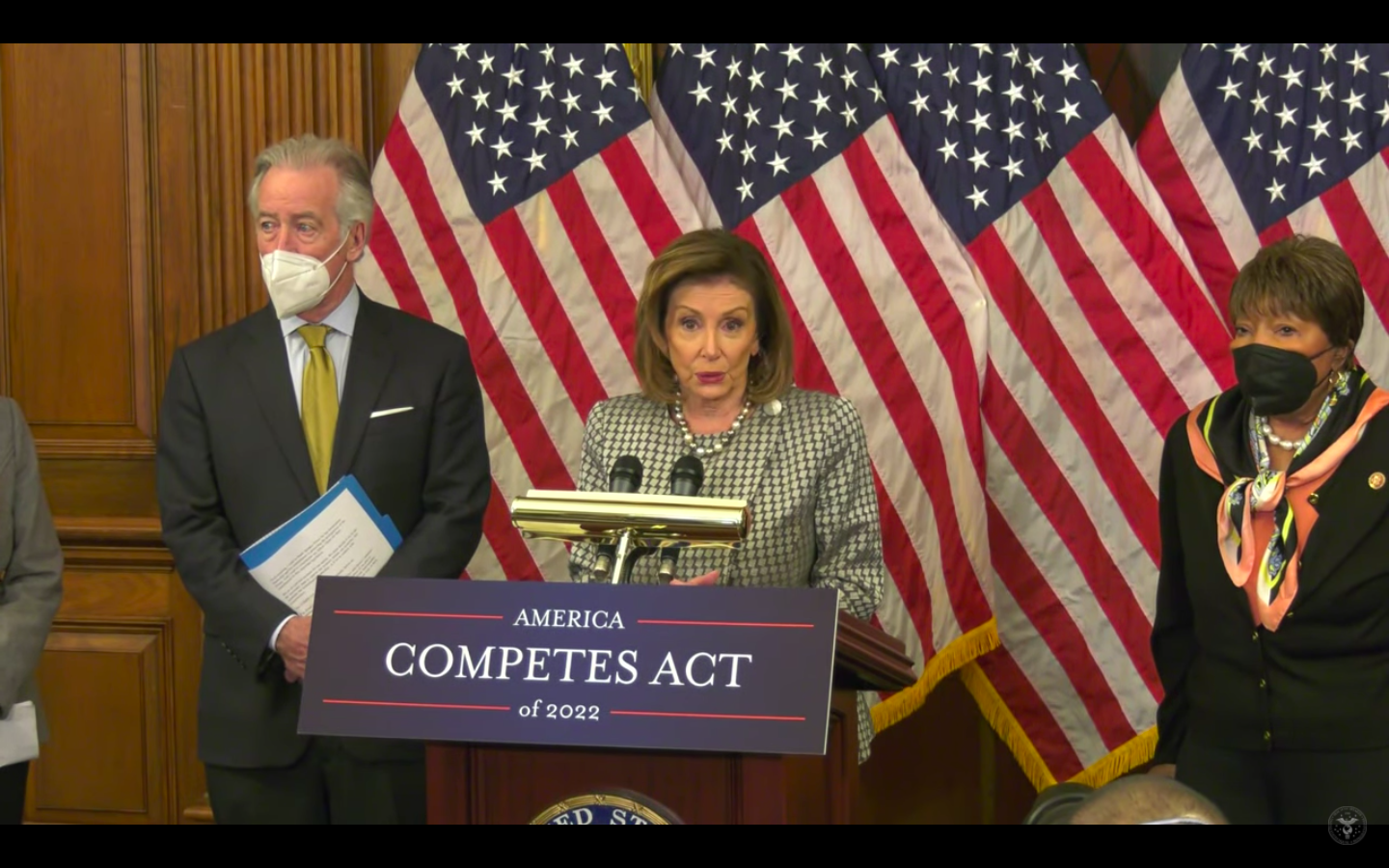WASHINGTON (CN) — Goosing the country's funding of domestic manufacturing and technological research, the House passed legislation Friday aimed at curbing China's economic influence.
The America Competes Act would allocate billions of dollars to address supply chain strains and a global shortage of semiconductors, electronic chips that play a critical role in the production of medical devices, cars and computers.
The legislation passed the lower chamber by a 222–210 vote Friday by a near-party-line vote.
Representative Stephanie Murphy of Florida was the sole Democrat to oppose the bill, and Representative Adam Kinzinger of Illinois was the only Republican to vote in favor of the legislation.
Speaker of the House Nancy Pelosi celebrated the passage Friday morning, calling the legislation critical to keeping the U.S. economically competitive.
"It is about making America independent, self-sufficient. Self-sufficient when it comes to chips, so that we can be manufacturing more efficiently in our country, lowering costs," Pelosi said during a news conference ahead of the House vote. "Self-sufficient when it comes to the supply chain, so that we're not depending on other countries at the mercy of or vulnerable to, sometimes countries of concern.:
But the legislation has received criticism from Republicans who argue it doesn't do enough to curb Chinese influence, with House Minority Leader Kevin McCarthy of California branding the House bill as "toothless."
"The COMPETES Act isn’t serious legislation — it is a façade to cover up the Democrats’ reluctance to actually do anything to hold China accountable and their desperation to do something to distract from their domestic crises. This is yet another example of Washington Democrats’ failed one-party rule," McCarthy said in a statement.
Now that the bill has passed the House, Senate and House lawmakers will have to meet at the negotiating table to reconcile the differences between this competitiveness bill and the Senate's version of the legislation, known as the United States Innovation and Competition Act, which passed the upper chamber last June.
Both bills strive to counter China through domestic investments, but disputes remain over the specific policies that can help the U.S. achieve that goal. These differences will need to be resolved before any of the policies can become law.
The bills each call for the investment of $52 billion to ramp up semiconductor research and manufacturing in the United States, reclaiming a share of the manufacturing sector that plays a critical role in modern technology production and has been strained throughout the pandemic.
The House legislation also doles out $45 billion over six years in grants and loans to upgrade U.S. supply chains and ramp up the manufacturing of goods critical to the economy.
It would give $160 billion for scientific research and increase funding for the Office of Science and the National Science Foundation to catalyze domestic innovation and development.
A number of changes to U.S. trade policies are also in the House bill, including reauthorization of a program to support production workers who have lost income or employment because of U.S. reliance on imports. To incentivize American manufacturing, the House bill also would open a window for some U.S. companies to import resources without paying tariffs.
The House's bill addresses human rights as well, setting stricter sanctions on China for its genocide of Uyghur Muslims.
While the Senate's version of the legislation authorizes $10 million for the U.S. to promote democracy in Hong Kong, the House bill goes a step further, providing a year-and-a-half of refugee status for Hong Kong residents fleeing Chinese encroachment.
One provision in the House bill that may become a point of contention between the chambers is a policy that empowers the Office of the U.S. Trade Representative to review when U.S. companies are moving abroad and, in some cases, give the office the power to block a move out of the U.S. if it could threaten supply chains or national security. The Senate cut a similar provision from their bill prior to its passage.
Subscribe to Closing Arguments
Sign up for new weekly newsletter Closing Arguments to get the latest about ongoing trials, major litigation and hot cases and rulings in courthouses around the U.S. and the world.









